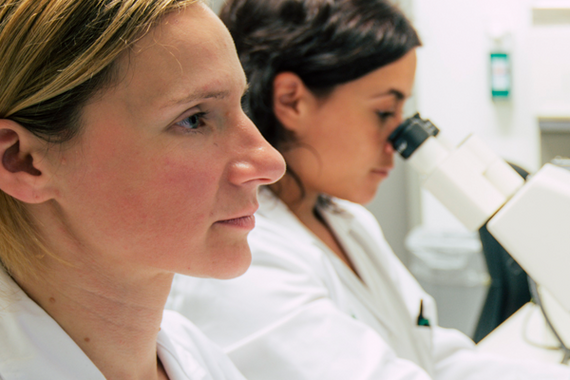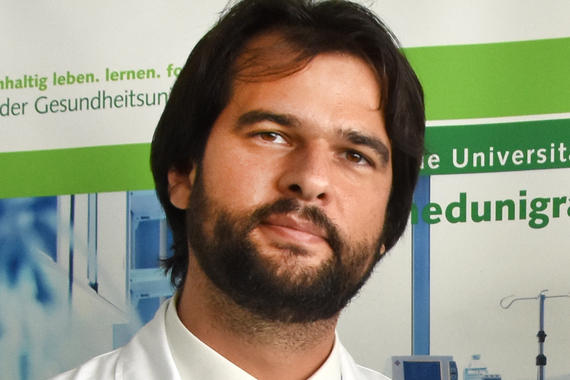-
Die Universität
- Herzlich willkommen
- Das sind wir
- Medien & PR
-
Studium
- Allgemein
- Studienangebot
- Campusleben
-
Forschung
- Profil
- Infrastruktur
- Kooperationen
- Services
-
Karriere
- Arbeitgeberin Med Uni Graz
- Potenziale
- Arbeitsumfeld
- Offene Stellen
-
Diagnostik
- Patient*innen
- Zuweiser*innen
-
Gesundheitsthemen
- Gesundheitsinfrastruktur
Forschungsteam Martin Stradner
Autoimmunrheumatische Erkrankungen sind schmerzhaft und können lebensbedrohlich sein. Die meisten dieser Krankheiten werden durch ein gestörtes Immunsystem verursacht, das körpereigenes Gewebe angreift. Das primäre Sjögren-Syndrom (PSD) ist eine systemische Autoimmunerkrankung, die häufig falsch diagnostiziert oder übersehen wird, was zu einer erheblichen Verzögerung der Diagnose führt. Daher stammt der größte Teil des derzeitigen Wissens über die Pathophysiologie des pSD von Patient*innen mit langjähriger Erkrankung. Die Symptome der Patient*innen, der Immunphänotyp und die Gewebeentzündung zu Beginn der pSD sind unbekannt, und Biomarker für eine frühzeitige Diagnose wurden bisher nicht untersucht.
Ansprechpartner

Unser Ziel
Ziel unserer Forschung ist es, die Mechanismen zu verstehen, die zu Funktionsstörungen des Immunsystems und rheumatischen Erkrankungen führen. Deshalb untersuchen wir Risikokohorten für rheumatische Erkrankungen, um Einblicke in die frühen Stadien der Fehlfunktion des Immunsystems zu gewinnen. Wir glauben, dass die Identifizierung dieser Mechanismen dazu beitragen wird, rheumatische Erkrankungen zu diagnostizieren und letztendlich zu heilen.
Projekte
Pre-Sjögren Disease Targeted Immunology Evaluation
- Das übergeordnete Ziel des Projekts ist es, herauszufinden, ob die festgestellten Veränderungen des Immunsystems die Ursache für pSD sind oder lediglich die Folge einer anhaltenden Entzündung. Das als longitudinale Kohortenstudie angelegte Projekt identifiziert Personen mit einem Risiko für pSD (Prä-Sjogren-Patient*innen) und verfolgt deren Verlauf bis zur Entwicklung von pSD oder anderen systemischen Autoimmunerkrankungen. Anstatt sich auf Daten von Langzeitpatient*innen mit einer etablierten Dysregulation des Immunsystems zu stützen, wagt sich diese Forschung auf unbekanntes Terrain und untersucht die Veränderungen bei Personen, die eine Autoimmunerkrankung entwickeln. Die Methodik verbindet die klinische Forschung mit modernsten Labortechniken, um die Ergebnisse zu validieren und zu verstehen. Durch den Einsatz fortschrittlicher Instrumente wie der Einzelzell-RNA-Sequenzierung wird in der Studie ein detailliertes Profil der beteiligten Immunzellen erstellt.
The Association of Immune Aging and PI3K Signaling in Common Variable Immunodeficiency
- Die vorzeitige Alterung von Immunzellen, die auch als Immunoseneszenz bezeichnet wird, ist ein häufig beobachtetes Phänomen bei verschiedenen Erkrankungen wie chronischen Infektionen, Autoimmunkrankheiten und Immunschwächekrankheiten wie der CVID (Common variable immunodeficiency). Die diesem Phänomen zugrundeliegenden Mechanismen sind vielschichtig und können sich bei diesen Entitäten in unterschiedlichem Maße überschneiden. Es gibt jedoch Krankheiten, denen ein klar definierter Mechanismus zugrunde liegt, wie das aktivierte Phosphoinositid-3-Kinase (PI3K)-Delta-Syndrom (APDS). Beim APDS führen Mutationen in der PI3K zu einer Überaktivierung des nachgeschalteten Signalwegs und damit zu einer vorzeitigen Alterung der Immunzellen. Es ist jedoch unklar, ob die Immunoseneszenz bei Patient*innen mit Autoimmunität mit einer veränderten PI3K-Signalübertragung zusammenhängt. Wir werden untersuchen, ob immunoseneszente Phänotypen mit einer veränderten PI3K-Signalübertragung verbunden sind, unabhängig von der Krankheitsentität. Trotz der vielfältigen Mechanismen, die der Immunalterung zugrunde liegen, könnte es eine übergreifende funktionelle Veränderung geben, die als therapeutisches Ziel dienen könnte.



